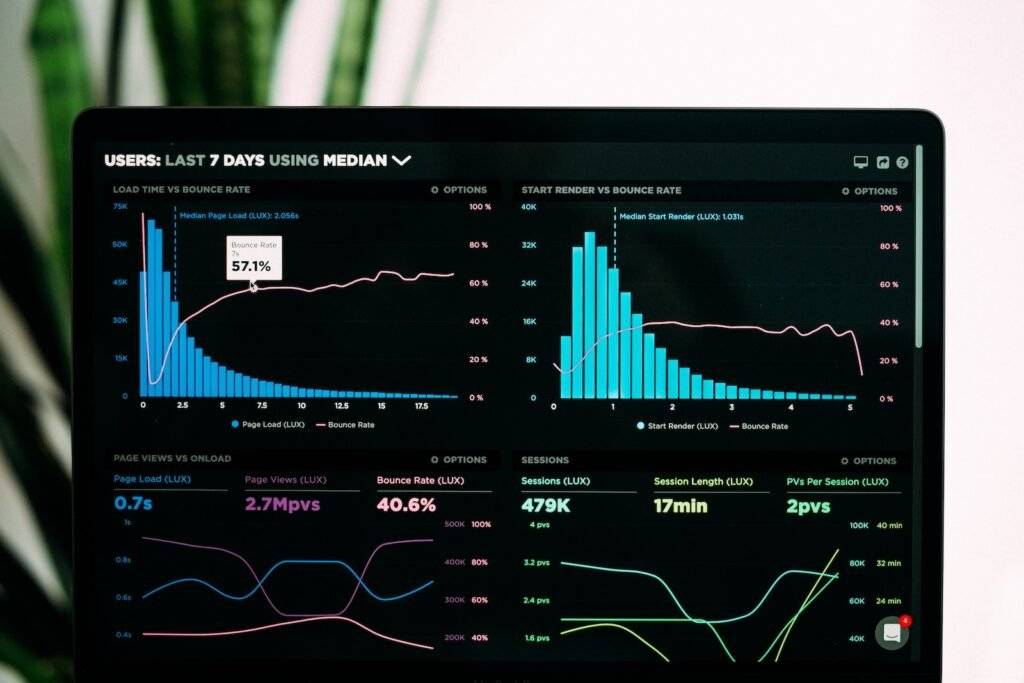The Importance of SEO Ranking Reports and Tracking SEO Performance
Understanding SEO Ranking Reports is very important in modern day SEO. Tracking SEO performance is crucial for businesses looking to maximize their online presence and drive organic traffic to their websites. By monitoring and analyzing SEO metrics, businesses can gain valuable insights into the effectiveness of their strategies and make informed decisions to improve their rankings and visibility in search engine results.
One of the main reasons for tracking SEO performance is to understand how well a website is performing in search engine rankings. By monitoring key metrics such as keyword rankings, organic search traffic, and backlink profiles, businesses can gauge the success of their SEO efforts and identify areas for improvement. This data allows businesses to make data-driven decisions, optimize their websites for better visibility, and ultimately increase their chances of attracting more qualified organic traffic.
In addition to measuring rankings and traffic, tracking SEO performance also provides businesses with insights into the effectiveness of their on-page optimization. By evaluating factors such as meta tags, site structure, and content relevancy, businesses can identify areas where improvements can be made to boost their rankings and increase their online visibility. This not only helps businesses improve their website’s performance in search engine rankings but also enhances the overall user experience, leading to increased engagement and conversions.
Overall, tracking SEO performance is an essential aspect of any successful digital marketing strategy. By monitoring key metrics and analyzing data, businesses can make data-driven decisions, optimize their websites, and improve their rankings and visibility in search engine results. In the ever-competitive online landscape, staying on top of SEO performance is crucial for businesses looking to stay ahead of the game and drive organic traffic to their websites.
Key Metrics to Include in Your SEO Ranking Reports
When it comes to creating comprehensive SEO ranking reports, there are several key metrics that you should include. These metrics will provide valuable insights into the performance of your website and help you make informed decisions to improve your rankings.
First and foremost, you will want to track your organic search traffic. This metric measures the number of visitors that come to your website through search engine results. By analyzing organic search traffic, you can determine which keywords and phrases are driving the most traffic to your site and adjust your SEO strategies accordingly. Additionally, tracking your organic search traffic over time can help you identify trends and patterns, allowing you to optimize your website for maximum visibility and rankings.
Understanding Organic Search Traffic and its Impact on Rankings
When it comes to optimizing your website for search engines, understanding organic search traffic and its impact on rankings is crucial. Organic search traffic refers to the number of visitors that come to your website through search engine results, without any paid advertising. This type of traffic is highly valuable because it represents users who are actively searching for information, products, or services related to your website.
The impact of organic search traffic on rankings cannot be underestimated. Search engines, such as Google, prioritize websites that receive a high volume of organic traffic as it indicates the relevance and usefulness of the website’s content. Essentially, the more organic traffic your website receives, the higher it will rank in search engine results pages (SERPs). This is why it is essential to focus on improving your organic search traffic through effective search engine optimization (SEO) strategies. By optimizing your website for specific keywords and providing valuable content, you can increase your chances of attracting more organic traffic, which in turn, can boost your website’s rankings.
Analyzing Keyword Rankings and Their Effect on Website Traffic
Analyzing keyword rankings is a fundamental aspect of understanding the performance of your website’s search engine optimization (SEO) strategy. Keyword rankings have a direct correlation to the amount of traffic your website receives from organic search. When your website ranks higher for relevant keywords, it is more likely to be displayed on the first page of search engine results, increasing the visibility and exposure of your brand.
By analyzing keyword rankings and their effect on website traffic, you can gain valuable insights into the effectiveness of your SEO efforts. Isolating the keywords that generate the most traffic for your website allows you to optimize your content and target your audience more effectively. This analysis helps you identify which keywords are driving the most valuable organic traffic and allows you to tailor your SEO strategy accordingly. A comprehensive understanding of keyword rankings empowers you to make informed decisions about optimizing your website for improved visibility and increased traffic.
Evaluating On-Page Optimization Factors for Higher Rankings

On-page optimization is a crucial factor in achieving higher rankings in search engine results pages (SERPs). It involves optimizing various elements on your website to make it more search engine friendly and improve its relevance to the targeted keywords. When evaluating on-page optimization factors, there are several key aspects that need to be considered.
Firstly, you should focus on optimizing your website’s meta tags, including the title tag, meta description, and meta keywords. These tags provide a summary of your webpage’s content to search engines, helping them understand what your page is about and improving its visibility in search results.
Secondly, you need to pay attention to the structure and organization of your website’s content. Ensure that your website has a clear hierarchy with well-defined categories and sub-categories. This not only helps users navigate through your site easily but also assists search engines in understanding the topical relevance of your content.
Furthermore, it is important to optimize your website’s URLs, ensuring they are descriptive and contain relevant keywords. This helps search engines and users alike in understanding the content of your page.
Additionally, make sure to optimize your webpage’s headings and subheadings by incorporating relevant keywords. This provides both users and search engines with a clear understanding of the main topics discussed on your page.
Lastly, optimize your website’s images by using relevant keywords in the image file names, alt tags, and captions. This helps search engines understand the context of the images and improves your page’s relevance in image searches.
By evaluating and optimizing these on-page factors, you can enhance your website’s visibility in search engine rankings and attract more organic traffic.
The Role of Backlinks in SEO Ranking Reports
Backlinks play a crucial role in SEO ranking reports as they are a key factor in determining a website’s authority and trustworthiness. When search engines crawl websites, they evaluate the quality and relevance of the backlinks pointing towards them. A higher number of high-quality backlinks indicates to search engines that your website is trustworthy and provides valuable content.
A strong backlink profile can significantly impact your website’s rankings by increasing its visibility in search engine results pages (SERPs). Backlinks from authoritative websites in your industry can drive relevant traffic to your site and improve your chances of ranking higher for targeted keywords. Moreover, backlinks can also help search engines discover and index your webpages more efficiently, ultimately leading to better rankings.
To optimize the role of backlinks in your SEO ranking reports, it is important to focus on acquiring high-quality backlinks from reputable sources. This can be achieved through strategies such as guest blogging, influencer outreach, creating valuable content that naturally attracts backlinks, and monitoring your backlink profile regularly to identify and disavow any low-quality or spammy links. By understanding and leveraging the power of backlinks, you can effectively boost your website’s SEO performance and improve its rankings in search engine results.
Exploring the Power of Local SEO Ranking Reports
Local SEO ranking reports play a crucial role in determining the success of businesses in their respective local markets. These reports provide valuable insights into the performance of a website in local search results, helping businesses identify areas for improvement and opportunities for growth.
By analyzing local SEO ranking reports, businesses can assess their visibility in local search results, track the progress of their local SEO efforts, and make informed decisions to optimize their online presence. These reports offer valuable data on key metrics such as local keyword rankings, organic search traffic, and user engagement, allowing businesses to gauge their performance against local competitors and identify areas where they can gain a competitive edge.
Furthermore, local SEO ranking reports provide businesses with insights into the effectiveness of their local SEO strategies. By tracking the impact of specific optimization efforts on their local search rankings, businesses can refine their strategies and focus on the factors that have the most significant influence on their visibility in local search results. With the power of local SEO ranking reports, businesses can unlock the full potential of their online presence and propel themselves ahead of the competition in their local markets.
Unveiling the Secrets of Mobile SEO Ranking Reports
Mobile SEO ranking reports provide valuable insights into the performance of your website on mobile devices. With more and more people using smartphones and tablets to browse the internet, it is crucial to optimize your site for mobile users. By unveiling the secrets of mobile SEO ranking reports, you can gain a competitive edge and improve your website’s visibility in mobile search results.
One of the key factors to consider in mobile SEO ranking reports is the site’s mobile friendliness. Mobile-friendly websites are designed to provide a seamless user experience, with easy navigation, fast loading times, and responsive design. Mobile SEO ranking reports can help you identify any issues that may be affecting the mobile-friendliness of your site, such as slow page speeds or unresponsive elements. By addressing these issues, you can ensure that your website ranks well in mobile search results and delivers a positive user experience.
Additionally, mobile SEO ranking reports offer insights into mobile-specific ranking factors. These factors include mobile page speed, mobile usability, and mobile search intent. By analyzing these metrics, you can optimize your website for mobile users and improve its visibility in mobile search results. Mobile SEO ranking reports also provide data on mobile search traffic and conversions, enabling you to track the performance of your mobile SEO campaigns and make data-driven decisions to enhance your mobile strategy.
In conclusion, mobile SEO ranking reports are essential tools for businesses looking to optimize their websites for mobile users. By understanding the secrets of these reports, you can improve your website’s mobile-friendliness, optimize for mobile-specific ranking factors, and achieve higher visibility in mobile search results. Stay tuned for the future of mobile SEO ranking reports and emerging trends in mobile optimization.
The Influence of User Experience on SEO Rankings

User experience plays a crucial role in determining the success of a website’s SEO rankings. Search engines like Google consider user experience signals as an indicator of website quality and relevancy to users. When users have a positive experience on a website, they are more likely to engage with the content, stay longer, and potentially convert. This increased engagement signals to search engines that the website is providing value to users, which can positively impact its rankings.
One important aspect of user experience is website loading speed. Slow-loading websites can frustrate users and lead to higher bounce rates. Search engines take note of this and may penalize websites with poor loading times. It is, therefore, imperative for website owners to optimize their website’s speed to ensure a seamless browsing experience for visitors.
Furthermore, the organization and structure of a website can greatly impact user experience. Websites that are easy to navigate, with clear menus and intuitive user interfaces, tend to have higher user engagement and longer visit durations. On the other hand, websites that are cluttered, confusing, or difficult to navigate may result in users leaving quickly, leading to high bounce rates. Taking the time to design a user-friendly website can greatly improve both user experience and SEO rankings.
Incorporating Social Signals into Your SEO Ranking Reports
Incorporating social signals into your SEO ranking reports is essential for a comprehensive analysis of your website’s performance. Social signals refer to the interactions and engagement your content receives on various social media platforms. These signals can provide valuable insights into how well your content is resonating with your target audience and can have a significant impact on your search engine rankings.
When it comes to incorporating social signals into your SEO ranking reports, there are several key metrics to consider. First, you’ll want to track the number of likes, shares, comments, and mentions your content receives on social media. These metrics can indicate the level of engagement and interest in your content, which search engines take into account when determining rankings. Additionally, monitoring the growth of your social media following and the reach of your content can provide valuable information about the overall visibility and popularity of your website.
By analyzing these social signals and incorporating them into your SEO ranking reports, you can gain a deeper understanding of how social media interactions impact your website’s visibility and rankings. This information can help you make informed decisions about your content strategy and optimize your website for improved performance in both social media and search engine results.
The Impact of Technical SEO Factors on Rankings
Technical SEO factors play a crucial role in determining a website’s ranking in search engine result pages (SERPs). These factors encompass various aspects of a website’s structure and performance, such as site speed, mobile responsiveness, indexing, and crawlability. Neglecting these technical aspects can have a detrimental impact on a website’s visibility and organic traffic.
Site speed is one of the key technical factors that search engines consider when ranking websites. A slow-loading website not only frustrates users but also leads to higher bounce rates, which signals poor user experience. Additionally, search engines prioritize websites that deliver a fast and seamless browsing experience, resulting in higher rankings.
Another important technical SEO factor is mobile responsiveness. With the majority of internet traffic coming from mobile devices, search engines have placed significant emphasis on ensuring that websites are optimized for mobile users. A mobile-friendly website not only improves user experience but also contributes to higher rankings in mobile search results.
In conclusion, technical SEO factors should not be overlooked as they have a direct impact on a website’s ranking in search engine results. By optimizing site speed, ensuring mobile responsiveness, and addressing other technical aspects, website owners can improve their visibility and attract more organic traffic. Stay tuned to explore more about the impact of different SEO factors on rankings.
Tracking Competitor Rankings to Stay Ahead in the SEO Game
To thrive in the highly competitive world of SEO, it is crucial to continuously monitor and track the rankings of your competitors. Tracking competitor rankings allows you to gain valuable insights into their strategies, identify areas for improvement, and ultimately stay ahead in the SEO game.
By analyzing the rankings of your competitors, you can gain a deeper understanding of the keywords they are targeting and the tactics they are employing to achieve higher visibility in search engine results. This information can then be used to refine your own SEO strategy and ensure that you are not missing out on any opportunities for growth. Additionally, tracking competitor rankings helps you stay informed about industry trends and changes, allowing you to adapt and adjust your approach accordingly.
Remember, the goal is not to simply copy what your competitors are doing, but rather to learn from their successes and failures. By carefully monitoring their rankings and analyzing their strategies, you can stay one step ahead and maintain a competitive edge in the ever-evolving world of SEO.
The Role of Content Quality in SEO Ranking Reports

Content quality plays a crucial role in SEO ranking reports, as search engines are constantly evolving to provide their users with the most relevant and valuable information. Gone are the days when keyword stuffing and low-quality content could trick search engines into ranking a website higher. Today, search algorithms are designed to prioritize websites that offer high-quality, informative, and engaging content.
When it comes to SEO ranking reports, content quality can mean the difference between ranking on the first page of search results or being buried among the countless other websites. Search engines assess various factors to determine content quality, including readability, relevance, and user engagement metrics. Websites with well-written, properly structured content are more likely to attract and retain visitors, increasing their chances of ranking higher in search results.
In order to ensure that your content meets the standards of search engine algorithms and resonates with your target audience, it is essential to invest time and effort into creating valuable content. Conduct thorough keyword research to identify relevant topics and integrate them naturally into your content. Focus on producing comprehensive and well-organized articles that address the needs and interests of your target audience. By consistently delivering high-quality content, you can improve your chances of achieving better rankings and attracting organic traffic to your website.
Evaluating the Performance of SEO Landing Pages
Evaluating the performance of SEO landing pages is crucial for the success of any online business. These pages act as the gateway to your website, attracting and engaging potential customers. By monitoring their performance, you can identify areas for improvement and optimize your pages to rank higher in search engine results.
One key metric to consider when evaluating SEO landing pages is the conversion rate. This metric measures the percentage of visitors who take the desired action, such as making a purchase or signing up for a newsletter. A high conversion rate indicates that your landing page is effectively converting visitors into customers, while a low conversion rate may signal issues with the page’s design, content, or user experience. By analyzing the conversion rate, you can identify and address any barriers or friction points that are preventing visitors from taking the desired action.
Another important aspect to consider when evaluating SEO landing pages is the bounce rate. The bounce rate refers to the percentage of visitors who leave your website after viewing only one page. A high bounce rate may indicate that your landing page is not engaging or relevant enough to visitors, leading them to quickly navigate away. By identifying and addressing the factors contributing to a high bounce rate, such as slow page load times or irrelevant content, you can improve the overall user experience and increase the chances of visitors navigating further into your website.
Understanding the Importance of Site Speed in SEO Rankings
Site speed is a crucial factor that directly impacts the SEO rankings of a website. In today’s fast-paced digital world, users expect websites to load quickly and seamlessly. If a site takes too long to load, users are likely to abandon it and move on to a competitor’s site, resulting in higher bounce rates. Additionally, search engines like Google consider site speed as a ranking factor, prioritizing websites that offer a better user experience.
When it comes to SEO rankings, every millisecond counts. Slow-loading websites not only suffer from lower organic traffic but also face a drop in rankings. In fact, studies have shown that websites with faster loading times tend to have higher click-through rates (CTR) and conversion rates. Optimizing site speed involves various aspects, such as reducing server response time, optimizing images and media files, minifying code, and leveraging browser caching. By investing time and effort into improving site speed, website owners can boost their chances of ranking higher in search engine results pages and ensure a positive user experience.
The Significance of User Engagement Metrics in SEO Ranking Reports
User engagement metrics play a vital role in determining the success of any SEO campaign. When it comes to ranking reports, these metrics provide valuable insights into how users interact with a website and its content. By analyzing user engagement metrics, such as bounce rate, time on site, and page views, SEO professionals can gain a better understanding of the effectiveness of their strategies and the overall user experience.
For instance, a high bounce rate may indicate that the website is not meeting the expectations of its visitors. This could be due to slow loading times, irrelevant content, or a confusing navigation structure. On the other hand, a low bounce rate coupled with a high average time on site suggests that users are finding value in the content and actively engaging with it. By measuring and analyzing these user engagement metrics, SEO professionals can identify areas for improvement and make data-driven decisions to enhance the overall user experience and improve search engine rankings.
The Role of Voice Search Optimization in SEO Rankings
Voice search optimization has become a crucial aspect of SEO rankings. With the rise of voice assistants like Siri, Alexa, and Google Assistant, more users are turning to voice search to find information and make inquiries. As a result, businesses need to ensure that their websites are optimized for voice search to maintain a competitive edge in the digital landscape.
One of the key considerations in voice search optimization is understanding the way people phrase their queries when using voice search. Unlike traditional search queries, voice searches tend to be more conversational and longer in nature. Therefore, it is important to optimize website content with natural language and long-tail keywords that align with how users speak. This ensures that search engines can interpret the content correctly and provide relevant results to voice search queries. By incorporating voice search optimization into their SEO strategies, businesses can enhance their visibility and reach a wider audience that relies on voice assistants for information.
• Voice search optimization has become crucial for SEO rankings
• Rise of voice assistants like Siri, Alexa, and Google Assistant has increased the use of voice search
• Businesses need to optimize their websites for voice search to stay competitive in the digital landscape
• Understanding how people phrase their queries in voice searches is important for optimization
• Voice searches are more conversational and longer in nature compared to traditional searches
• Website content should be optimized with natural language and long-tail keywords that align with user speech patterns
• Optimized content helps search engines interpret it correctly and provide relevant results
• Incorporating voice search optimization into SEO strategies can enhance visibility and reach a wider audience
The Impact of Local Directory Listings in SEO Ranking Reports
Local directory listings play a crucial role in SEO ranking reports as they have a significant impact on a website’s visibility and local search rankings. These directories, such as Google My Business, Yelp, and Yellow Pages, allow businesses to showcase their information, including contact details, address, and customer reviews.
By having accurate and up-to-date listings on these directories, businesses can improve their online presence and increase their chances of ranking higher in local search results. When search engines like Google see consistent and reliable information across multiple directories, it helps establish trust and credibility for the business. Moreover, local directory listings also provide valuable backlinks to the website, which further enhances SEO rankings. Overall, ensuring that your business is listed in relevant local directories and optimizing those listings can greatly impact your SEO performance in local search.
Tracking the Effectiveness of SEO Campaigns with Conversion Rates

Conversion rates play a crucial role in determining the effectiveness of an SEO campaign. While driving traffic to a website is important, the ultimate goal is to convert those visitors into paying customers or take desired actions such as subscribing to a newsletter or filling out a contact form. By tracking conversion rates, businesses can gauge the success of their SEO efforts and identify areas of improvement.
One key metric to monitor when tracking conversion rates is the number of website visitors who complete a specific action, such as making a purchase or filling out a lead form. By tracking these actions, businesses can identify which keywords, landing pages, or marketing channels are driving the most conversions. This data allows companies to make data-driven decisions and allocate resources effectively to optimize their SEO campaigns for maximum conversion rate. Additionally, tracking conversion rates can help in identifying any barriers or friction points in the user journey, enabling businesses to refine and enhance the user experience to increase conversions.
The Future of SEO Ranking Reports and Emerging Trends
The future of SEO ranking reports holds promising advancements and emerging trends that will shape the way we measure and optimize website performance. As search engines continue to evolve and user behavior shifts, it is crucial for businesses and marketers to adapt their SEO strategies accordingly.
One emerging trend is the integration of artificial intelligence (AI) and machine learning (ML) technologies in SEO ranking reports. AI-powered algorithms can analyze vast amounts of data quickly and accurately, providing valuable insights into keyword performance, user intent, and content relevance. ML algorithms can also identify patterns and trends in search engine behavior, allowing SEO professionals to make data-driven decisions and optimize their strategies for maximum impact.
Another significant trend is the emphasis on user experience (UX) metrics in SEO ranking reports. Search engines are increasingly prioritizing websites that provide a seamless and engaging user experience. Factors such as page load speed, mobile responsiveness, and intuitive navigation are becoming critical ranking factors. As a result, SEO ranking reports are evolving to include metrics that measure UX, enabling businesses to identify areas for improvement and enhance their website’s performance.
FAQs:
Why is tracking SEO performance important?
Tracking SEO performance allows you to measure the effectiveness of your strategies, identify areas for improvement, and make data-driven decisions to optimize your website’s rankings.
What key metrics should I include in my SEO ranking reports?
Key metrics to include in your SEO ranking reports may include organic search traffic, keyword rankings, on-page optimization factors, backlinks, user experience metrics, and social signals.
How does organic search traffic impact rankings?
Organic search traffic refers to the number of visitors coming to your website through search engine results. Higher organic search traffic indicates a strong online presence, which can positively impact your rankings.
How do keyword rankings affect website traffic?
Keyword rankings determine where your website appears in search engine results for specific queries. Higher keyword rankings can lead to increased visibility and organic traffic to your website.
What is the role of backlinks in SEO ranking reports?
Backlinks are incoming links from other websites to yours. They are a crucial factor in SEO ranking reports as they indicate the authority and relevance of your website, which can positively impact your rankings.
How can local SEO ranking reports benefit my business?
Local SEO ranking reports help businesses optimize their online presence for local searches, allowing them to attract nearby customers and increase visibility within their target location.
What should I consider in mobile SEO ranking reports?
Mobile SEO ranking reports focus on optimizing websites for mobile devices. Factors such as mobile-friendly design, page speed, and mobile search visibility are crucial for higher rankings in mobile search results.
How does user experience influence SEO rankings?
User experience, including factors like website usability, page loading speed, and mobile responsiveness, plays a significant role in SEO rankings. Search engines prioritize websites that provide a positive user experience.
Why should I incorporate social signals into my SEO ranking reports?
Social signals, such as likes, shares, and comments on social media platforms, indicate the popularity and relevance of your content. Including social signals in SEO ranking reports helps measure the impact of social media on your rankings.
What is the impact of technical SEO factors on rankings?
Technical SEO factors, such as website structure, indexing, crawlability, and site speed, affect how search engines understand and rank your website. Optimizing these factors can improve your rankings.










